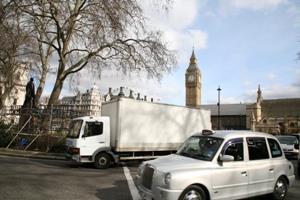
Commercial vehicles looking to load or unload on yellow lines may soon find themselves fighting for space after plans put forward by secretary of state for communities and local government, Eric Pickles, to let general motorists park for limited periods on yellow lines.
Pickles has proposed allowing motorists to park free of charge on double yellow lines for up to 15 minutes in order to help boost business on the nation’s high streets, expressing concerns that hefty parking fines and “over-aggressive” parking enforcement were one reason many of them have been struggling.
The plans have already proved divisive, however. Business secretary Vince Cable backed the proposal, adding that “a little bit of common sense and flexibility is very much to be welcomed” on the issue. Transport minister Norman Baker, however, told one national newspaper the plan “undermines the purposes of the yellow line”, adding that he had been advised it would be “unworkable”.
The FTA has also warned the plan could be difficult to deliver successfully. “I can see why this has been suggested, but I don’t think this is the right answer,” said Natalie Chapman, head of policy for London. Allowing the general motorist to park in such areas could lead to “yellow lines stuffed full of vehicles,” she said, impeding freight deliveries and potentially raising congestion. “If that happens, local authorities could respond by introducing loading restrictions that would directly affect our members,” she warned.
Instead of allowing general motorists to park on yellow lines, it would be better to replace them in selected areas with 15-minute parking bays and leave yellow line restrictions in place, said Chapman.
The FTA has also called for more consistency in the time limits applied by different London boroughs to loading/unloading operations by commercial vehicles on yellow lines, pointing out that some only allow 20 or 40 minutes while others allow unlimited periods depending on the time of day; they also vary by gross vehicle weight in some cases.
Meanwhile, official statistics published since Pickles’ plans were revealed showed that councils are forecasting £635m in profits from parking charges and fines in the current financial year. Pickles said the figure underlined the need “to review and rein in unfair town hall parking rules”, adding: “The law is clear that parking is not a tax or cash cow for town hall officers”.
However Peter Box, chairman of the Local Government Association’s economy and transport board, defended councils’ approach to parking charges and fines. “Parking revenue is spent on paying for parking services. Any money left over goes towards transport services like filling potholes, concessionary travel, park and rides, street lights and road improvement projects,” he said.














